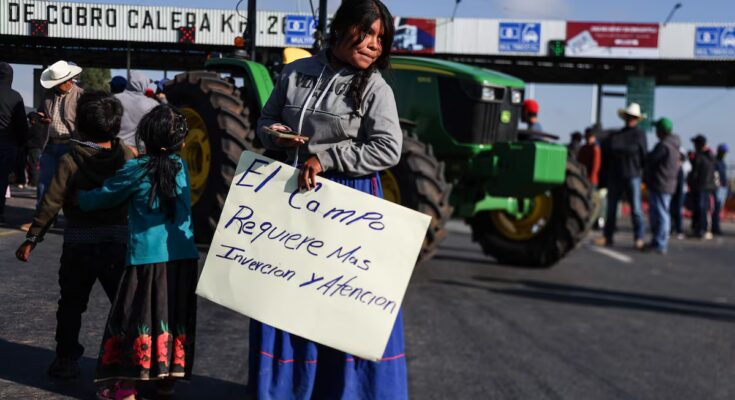Agricultural and transport organizations have joined forces and called a nationwide strike for November 24. The blocking of roads, the seizure of customs and the closure of border crossings are some of the actions that will be carried out during the day. The formula worked to pressure Claudia Sheinbaum’s government to meet their demands. The rejection of the accelerated approval of the Water Law proposed by the president, the exclusion of basic grains from the Treaty between Mexico, the United States and Canada (T-MEC), the creation of a development bank for the countryside, – disappeared by former president Andrés Manuel López Obrador – and more guaranteed prices, as well as greater safety on federal highways, make up the list of demands.
Leaders from different sectors of the industry respected the agreements agreed this weekend, this newspaper reports. The National Front for Landscape Rescue and the National Association of Transporters announced the synergy on Monday. “From today every farmers’ blockade will also be a transport blockade and every transport demand will be a demand from the countryside,” they said in a statement. In a press conference this Tuesday in front of the National Palace – seat of the presidency -, the peasant and transport leaders outlined the roadmap they will follow to make themselves heard.
The intention of the ruling bloc of Morena, PVEM and PT to accelerate the discussion on Sheinbaum’s National Water Law so that it can advance to Congress before December 15 has created a new point of conflict between agricultural and livestock organizations and the Government. The most controversial point of the conflict is that concessions for the use of water can no longer be transferred between private individuals, having to return to the State so that the National Water Commission (CONAGUA) can reassign them. The justification for this ban is to put an end to the illegal market in water concessions that has been created in the country. According to farmers, this makes it impossible for them to inherit or sell their lands, since without permission to use the water they have no value.
The tone of the mobilizations has become radicalized. A couple of weeks ago, the dispute over the price of a ton of corn led farmers to block roads for two days in at least 20 states of the Republic. This Tuesday’s announcement goes further. It includes the seizure of customs, the closure of the passage to freight trucks and the complete stop of the work of transporters. Dialogue with the party in power has not arrived. A day before the announcement, the peasants were planted by Morena deputies in the Lower House. The scheduled meeting with Alfonso Ramírez Cuéllar, deputy coordinator of the Morena bench, did not materialize. The farmers used the government’s willingness to set up a dialogue table as a bargaining chip to reconsider the mobilization. The bet of the representatives of the Mexican countryside is that President Sheinbaum will meet with them to listen to their requests, without the Secretaries of State acting as intermediaries.



